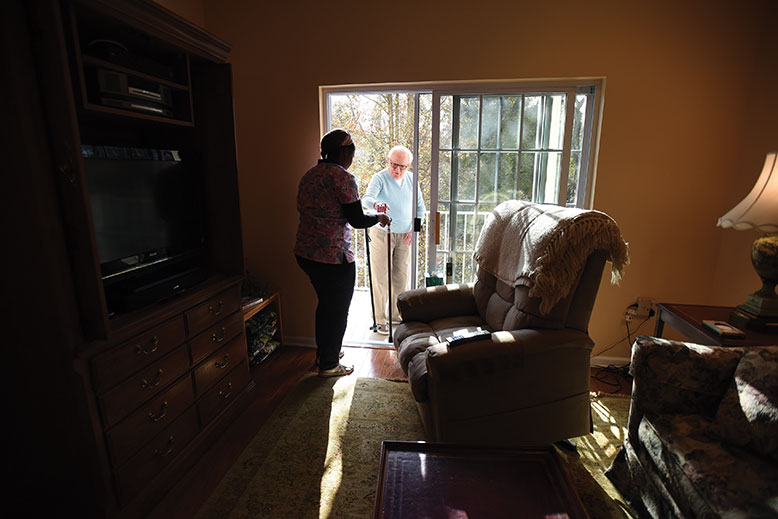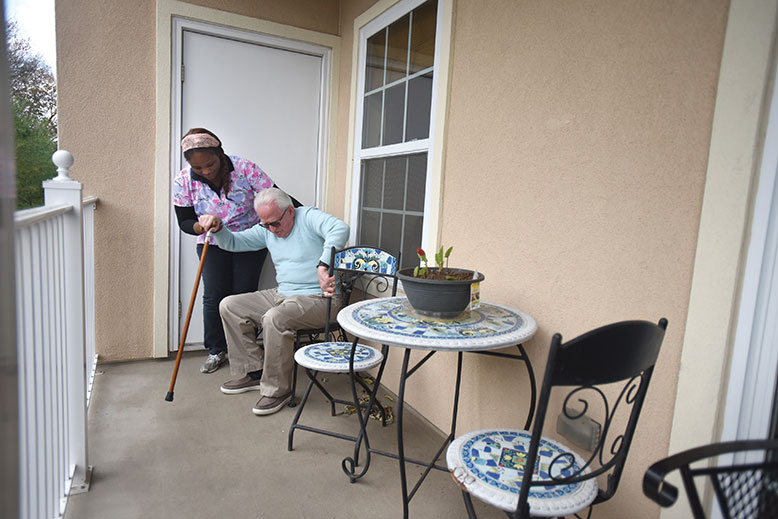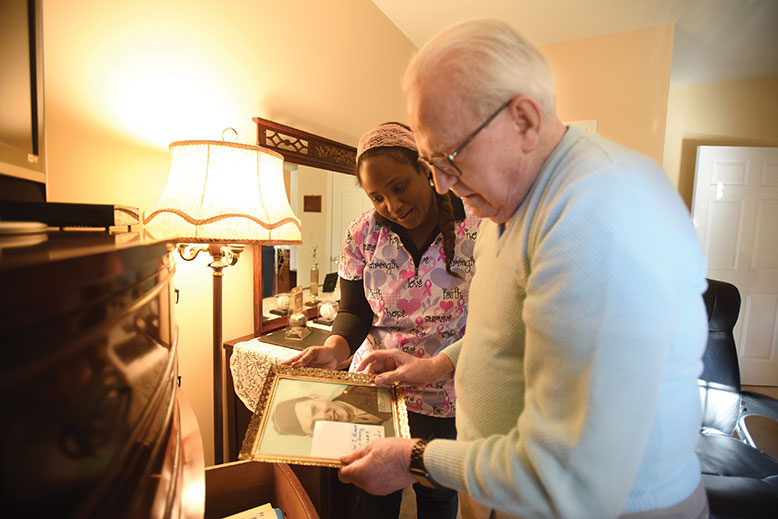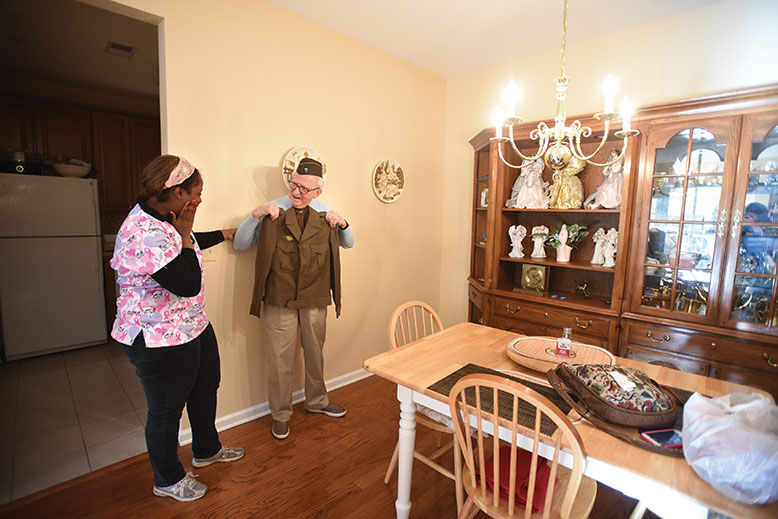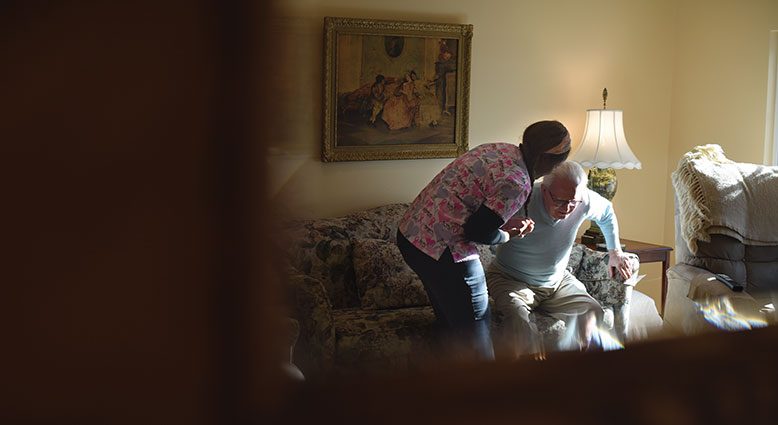
New Jersey has almost 39,000 home health aides, but you might never see one. The aides take care of the elderly and the disabled, helping them stay in their homes and out of institutions. Working behind gates in retirement communities and assisted-living centers, in private homes and apartments, aides are visible only when they take their charge out for the occasional walk or appointment.
Aides sleep in back rooms and on sofas, lightly, in case their charge wakes up in the middle of the night to use the bathroom. Sometimes they don’t get any rest at all. One aide in Middlesex County won a lawsuit against her home-care agency after her client repeatedly startled her awake in the middle of the night, contributing to a stroke.
Home health aides are disproportionately female, foreign-born and people of color. Half of the nation’s aides are members of families that rely on public assistance, including food stamps. They perform isolating, dangerous work, requiring a great deal of lifting, but 26 percent of aides lack health insurance. On average, they make just over $23,000 a year.
Low wages are a constant issue—and have actually declined 6 percent in the last decade. “I only have $15 today,” said one aide who chose to remain unidentified. “The bank is going to charge me a $35 overdraft fee. How am I going to eat?”
Until 2015, home-care workers were exempt from federal minimum wage requirements and overtime, a sad vestige of policies dictated by Southern lawmakers during the New Deal. Now that aides, especially live-ins, are due raises and eligible for overtime, many of the agencies they work through have reduced their shifts. But if working full-time at $10 an hour doesn’t put food on the table, how will working part-time?
The aides interviewed for this story—most of whom would not give their full names—describe immense challenges. Some clients, they say, are overtly racist; other clients and their families treat the aides as though they don’t exist. One aide was struck by a client but had to give two weeks’ notice to get another placement. Another was fired after revealing she was pregnant. Another complained that her agency refused to pay overtime.
Some aides describe taking people with dementia to the restroom countless times a day, being accused of stealing $1 from the table, being forbidden by clients to sit on the furniture or answer their personal calls. One aide could not work for more than a year after undergoing hand surgery, covered only by charity care. She got by on fumes, financially.
But with few options, the aides toil away, some driven by a passion for the work. Mary, 54, tries to treat her clients the way she hopes someone would treat her parents.
“It gives me more strength, more energy to work with them, no matter what they do to me,” she says. “My mother could be in that state of health. Am I going to throw her away because she’s screaming all night? This has helped me with my job…helped me be able to cope with it.”
Mary was a public-health superintendent and nurse back home in Cameroon. She left her three teenagers behind when an invitation from her brother in the United States paved the way for a visa. Upon arrival here, she was struck by Americans’ unwillingness to care for their elders.
“Here, ‘Can you change your mother’s diaper?’ is a problem for them. They will puke,” she says. “Some of them don’t even visit their mothers once every six months, not to mention having to take care of them in their house.”
Mary has chronic back pain, which was not helped by recent surgery. She was out of work for eight months. When a client fell on her, she was reinjured and filed a worker’s compensation case against her former agency.
The neglected smoke-alarm-battery chirps in the stairwell of Mary’s apartment in East Orange. The rent is $700 a month. She has decorated the place with a blue-and-white plaid sofa given to her when Patsy, a favorite former client, moved from an apartment to assisted living. Patsy gave Mary her bed as well.
Aides frequently try to keep track of and help each other. Mary recently traveled to Patsy’s retirement community half an hour away to visit her and settle a nagging question. An aide working there had passed away and Mary wanted to find out who it was. When Mary saw the dead woman’s picture, she realized she’d played cards with her and was quite upset. Mary later heard of another aide who was found dead in a client’s garage; the grapevine of aides had passed her picture around, as no one knew how to find that woman’s next of kin.
Mary deleted the picture from her phone.
Mary knows firsthand the many ways the job can affect one’s health and well-being. She remembers one difficult woman she worked for as a live-in aide. The agency had sent at least 10 aides to the woman’s apartment in a month. The woman would not let Mary sit on the couch; and even though Mary worked a 24-hour shift, she would not let her sleep.
“She’d say, ‘You don’t have to sleep. I am paying you. You have to check on me six times in the night and make sure I’m not wet. If not, I will call my daughter and say you never came to check on me in the night.’”
The woman required her to walk a great deal, and Mary was unable to sit to rest her back. “She would say, ‘Take me for my meals,’ and I would take her down to the dining room, and she would make me stand.” Mary managed to stay 10 days, until her pain became too great.
“The job we do is bigger than the peanuts they pay us,” she says. “We don’t have anybody to speak for us, like the nurses who go on strike.” Mary earns $1,100 or $1,200 a month—though she doesn’t always get called to work. Considering rent, phone bills and money sent back home, she lives from paycheck to paycheck, with $50 to $100 left each month for food and other essentials.
Despite the stress, Mary plans to stick with the work. “I like working with the elderly,” she says, with a soothing calmness in her lively eyes. “I like to put a smile on their faces. It’s a passion I have. It’s not only for the money, but for the heart of me.”
Mary expresses that passion in her off-hours by running a charity for widows, orphans and HIV/AIDS patients in Cameroon. She collects donated clothing and school supplies and ships them home, at a cost of up to $600 per shipment.
“You have to do the best you can,” says Mary, “and leave the rest for God.”
- Until his daughter took over his care, Lisa Morris worked as a live-in aide for John Homza. Photo by Jennifer S. Altman
- Lisa prepared meals and helped John maneuver around his home. Photo by Jennifer S. Altman
- Homza shows off his World War II memorabilia for Morris. Photo by Jennifer S. Altman
- Like many aides, Morris enjoys learning about a client’s history, often building close, personal bonds. Photo by Jennifer S. Altman
During the last five years of her life, my mother had live-in aides, all from agencies, as required by her senior community. Even with several aides who lasted more than nine months, more than 40 different women took care of her at one time or another. One treated her to lunch to celebrate the first anniversary of their time together; some made special efforts to keep her hair, makeup and wardrobe just the way she liked it. Some were not good for her. Some were proactive and competent. One sang to her. Some proselytized to her. One had health problems that got worse (and threatened my mother’s health) because aides lack sick days and sturdy medical insurance. Several cried as they saw my mother approaching death.
The agency model has its flaws. National studies show that just over half of agencies conduct federal background checks, and only a third test for competency or for drug use. Workers who accept low agency wages are generally not as qualified and resourceful as those who work privately for more.
The job, while dangerous, grueling and sometimes numbingly boring, is still one of the few available to people who have not completed high school. Jodi Sturgeon, president of the nonprofit Paraprofessional Healthcare Institute, says many new aide trainees had recently been receiving $4,000 a year on public assistance. As aides, they more than triple their income in their first year. Still, the profession’s turnover rate is remarkably high, with almost 62 percent of workers at private home-care agencies quitting or being fired each year.
Shortages in aides cause agencies and nursing homes to turn away hundreds of clients. The shortage is expected to reach crisis proportions. Each day, 10,000 baby boomers turn 65, and most want to age at home. The number of people over 65 is expected to almost double by 2050. About 1.3 million home health aides will be needed as soon as 2026, a 47 percent increase over 2016, while the number of working-age women is decreasing.
Some aides help their dying clients in crucial ways. Pauline Jackson, 64, who lives in Orange, was called to the death bed of one of her former clients, Laura. Jackson rushed to the woman’s home and sat next to her on the hospital bed.
“I held on to her hand and said, ‘Laura, it’s okay, we are okay on this side.’ Laura closed her eyes, and I said, ‘We are going to be all right, I told you,’ and she died.
“She was at peace,” Jackson says. “But to know a person before, and see them at the end, it’s hard. I cried when I saw the stage Laura reached. Oh my lord, it hurts so bad…. I just want their transition to be as peaceful, caring and loving as possible.”
Jackson had stopped working for Laura when the older woman began to need round-the-clock care, as Jackson had teenage granddaughters to supervise. She’s never worked for an agency, having had the luck to care for Jane, another private client, for 12 years. With Jane she attended family weddings and bar mitzvahs, enjoyed reading her the health and science sections of the newspaper, and took her for walks around Springfield, “just being a companion.”
Jackson came to the United States from Kingston, Jamaica about 25 years ago to give her three teenage children a better life, even though that meant leaving them behind for a decade.
“I cried for the first week every day,” she says. “It’s tough, I’m telling you. Tough.” She would see her children twice a year when she traveled back to Jamaica. Even when working three jobs at a time, she managed to send only about $500 a month home.
Jackson’s children eventually emigrated to the United States. Last year, she paid off the mortgage on a home in Jamaica, where she hopes to retire after she turns 70.
Lisa Morris also has felt the pain of a client’s passing. “It’s horrible, it’s heartbreaking,” says the 34-year-old Morris, who has worked as a home health aide for about 10 years. Raised in Honduras, Morris spent her formative years in Teaneck. She says she likes to help people and feels she can relate to her clients’ struggles. Her mother is also an aide, and they share cases occasionally, with Lisa taking the weekday hours.
For Morris, losing a client is also a reminder of her tenuous job security. “There’s no stability,” she says. “When you go into somebody’s home, you don’t know if it’s for one day and you’ll be gone the next. If you say something they don’t like or do something they don’t like, they put you out.”
Still, it’s not unusual for an aide and client to develop a substantial bond. After Jerry Weiss’s wife of 63 years passed away and he was recovering from heart surgery, he spent a couple of months with a daughter in Kentucky, but felt isolated in her residential neighborhood. He returned home to Montclair, and for the past two years, a private aide, Kathy-Ann Blair (not her real name), has helped him with cooking and laundry. She also accompanies him to many doctors’ appointments.
Blair, a native of Trinidad, makes fresh, healthy juices for the 90-year-old Weiss, has him following an exercise program, and stepped in when she felt his doctor was ordering too many tests. She is proud of the improvements in his health—and she makes sure he has a good laugh every evening, either from a comedy on television or a round of playful arguments. She’ll call him “young man” and remind him to do everything she tells him; he tells her that’s the quickest way to his grave.
“We really, really do kid around,” she says.
Weiss, a retired English professor, reads Blair’s personal essays and gives her constructive criticism. “She’s an excellent writer,” he says. “I’m trying to get her to write more.”
In 2016, the national academy of Medicine called for home health aides and other direct-care workers to be paid “a living wage commensurate with the skills and knowledge required to perform high-quality work.” Certainly, a clear career path out of poverty, with a chance for advancement, could attract more people to the profession. A system with tiered positions, such as advanced aide, and specialists in particular diseases like dementia or multiple sclerosis also would improve the level of care. Community college credit could be given for such work experience.
There is some progress to report. In Seattle, New York City and Washington, D.C., voters have passed a $15-an-hour minimum wage, which will be phased in gradually and eventually benefit home health aides. But many aides are paid by state Medicaid programs, which, due to budget constraints, are not expected to offer pay increases. Some home-care workers will simply quit for higher paying, safer and less stressful retail jobs. In New Jersey, the minimum wage is just $8.44, although it increases annually with inflation.
In New York and at least six other states, home health aides have unionized. In Illinois, aides won a 65 percent pay increase. New York State has also instituted an advanced home health aide position, in which, with additional training, aides can administer medication and monitor diabetic care.
If such reforms spread, perhaps home health aides will have reasons to stay on the job beyond their own altruism or a lack of options.
Amabel, 59, who lives in Newark, worked for the same person for 18 years and found it hard to recover from the death of the woman, who left money in her will to help pay down Amabel’s mortgage and student loans.
“I think I love taking care of them more than babies,” she says of her elderly clients. “From these people I get back knowledge.” She remembers a professor at Bloomfield College who encouraged her to get to know each client very well. “He said, ‘Sit with her and listen to everything she’s going to tell, because when she dies, 100 years is gone.’”
Amabel is now a nurse in charge of 54 patients at an extended-care facility. She continues to work part-time as a private aide.
“I’m in it because of compassion, because you want to give back,” she says. “I’m giving back the life that’s left to someone.”
Tina Kelley wrote about adoptees and birth families in the October issue. She lives in Maplewood.

